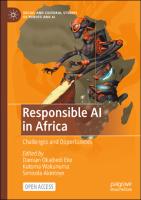Responsible AI in Africa
Challenges and Opportunities
Contributor(s)
Eke, Damian Okaibedi (editor)
Wakunuma, Kutoma (editor)
Akintoye, Simisola (editor)
Language
EnglishAbstract
This open access book contributes to the discourse of Responsible Artificial Intelligence (AI) from an African perspective. It is a unique collection that brings together prominent AI scholars to discuss AI ethics from theoretical and practical African perspectives and makes a case for African values, interests, expectations and principles to underpin the design, development and deployment (DDD) of AI in Africa. The book is a first in that it pays attention to the socio-cultural contexts of Responsible AI that is sensitive to African cultures and societies. It makes an important contribution to the global AI ethics discourse that often neglects AI narratives from Africa despite growing evidence of DDD in many domains. Nine original contributions provide useful insights to advance the understanding and implementation of Responsible AI in Africa, including discussions on epistemic injustice of global AI ethics, opportunities and challenges, an examination of AI co-bots and chatbots in an African work space, gender and AI, a consideration of African philosophies such as Ubuntu in the application of AI, African AI policy, and a look towards a future of Responsible AI in Africa. This is an open access book.
Keywords
Artificial Intelligence; AI Ecosystems in Africa; AI ethics; digital culture; SDGs; Sustainable Development Goals; AI policy; ICT infrastructure in Africa; AI governanceDOI
10.1007/978-3-031-08215-3ISBN
9783031082153, 9783031082153Publisher
Springer NaturePublisher website
https://www.springernature.com/gp/products/booksPublication date and place
Cham, 2023Grantor
Imprint
Palgrave MacmillanSeries
Social and Cultural Studies of Robots and AI,Classification
Sociology
Literature: history and criticism
Artificial intelligence
Human geography
Ethics and moral philosophy


 Download
Download Web Shop
Web Shop